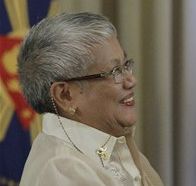Misuari, MNLF leaders to be offered seats in transition body for peace
MANILA, Philippines — The Nur Misuari-led Moro National Liberation Front (MNLF) will not be left behind once the Bangsamoro autonomous political entity replaces the Autonomous Region in Muslim Mindanao (ARMM) as the permanent Moro homeland, according to Presidential Peace Adviser Teresita Quintos-Deles.
To ensure that the MNLF is not left out in the ongoing peace process with its rival, the Moro Islamic Liberation Front (MILF), the Aquino administration would give the MNLF seats in the Transition Commission, Deles informed the Philippine Daily Inquirer during a dinner with its reporters and editors on Tuesday night.
She said that the MILF itself has expressed openness to working with the MNLF in bringing about peace in war-torn parts of Mindanao.
In a Palace briefing, Presidential Spokesperson Edwin Lacierda confirmed this, saying the MNLF “will not be marginalized.”
The Transition Commission is tasked to draft the basic law that will serve as the constitution of Bangsamoro, which will be submitted to Congress for legislation before subjected to a plebiscite throughout the areas comprising Bangsamoro.
Article continues after this advertisementThe government peace panel led by Marvic Leonen has a say in the composition of the 15-member body, so long as it is composed of “Bangsamoro people,” said Leonen, who was with Deles and another peace panel member, Senen Bacani, at the dinner.
Article continues after this advertisementUnder the framework agreement agreed on by both sides in Kuala Lumpur on Sunday, which was announced by President Aquino on the same day, the government can name seven members, while the MILF will select eight, including the chair of the Transition Commission.
Besides the MNLF, the other indigenous groups called the “Lumads” of Mindanao would also be given representation in the Transition Commission, said Deles.
Deles, however, tried to shun an unnecessary word war with Misuari as she refrained from commenting on his charge that the framework agreement was illegal because of the existing peace accord between the government and MNLF.
Leonen, however, disagreed with Misuari’s claim that the MNLF deal was “internationally recognized,” and thus could not be replaced or subsumed by the Bangsamoro deal.
“It is not a treaty,” said Leonen of the ’96 peace accord, explaining that the MNLF was “not a state” when it negotiated with the Philippine government.
He said that peace agreements were “political document that contains the political commitment of two sides.”
In the case of the Bangsamoro deal, Leonen said: “This framework agreement … is a roadmap where political commitments can be met by both sides.”
The agreement with the MILF is set to be signed on Oct. 15 in Malacañang between the two panels in the presence of President Aquino, MILF chair Al Haj Murad Ebrahim and Malaysian Prime Minister Datuk Seri Najib Tun Razak.
Misuari signed the MNLF peace accord with the Ramos administration in 1996.
He claimed that instead of solving the Mindanao problem, “this (framework agreement with the MILF) will plunge Mindanao into another war that the Philippine government cannot afford to have at this time.”
He warned that the MNLF has remained “alive and kicking” through the years.
To which Deles said: “We know they’re alive. We have never ignored them—I am the one talking with them. It is our intention to fix the problems and ensure that in the new political entity, they are there,” said Deles of the MNLF.
In a phone interview, Deles said that the MNLF was consulted “directly and through” Indonesia, the facilitator in the earlier peace talks with the MNLF.
“We have sent the message that we intend the process of making the new law inclusive—that they will have representation in the Transition Commission—an intent that we have communicated to the MILF as well,” he said.
According to Lacierda, the Organization of Islamic Conference (OIC), of which the MNLF has an observer status, has already convened MNLF and MILF leaders to “push for unity and coordination.”
Deles saw a “convergence” of these two major Moro factions in the Transition Commission as part of President Aquino’s wish to have an “all-inclusive” peace process in the search for a political solution to put an end to the decades-long secessionist conflict in Mindanao.
“Our policy from the start has been to push for convergence between the two (peace) tables. The OIC peace committee for Southern Philippines supports this. Significant segments of the MNLF have welcomed this development (and) are happy with this arrangement,” said Deles.
“With the ARMM government, we are working with the MNLF communities, which have clearly expressed their support for the peace process and have called for their leaders to unite,” she said.
Pressed for details, Deles disclosed that Misuari and the other MNLF faction led by Muslimin Sema have long wanted to amend Republic Act No. 9054, the law that gave flesh to the peace deal with the MNLF.
In fact, the government agreed to amend RA 9054, said Deles.
The Aquino administration and the MNLF have been conducting an “implementation review” of the ‘96 accord, “but the MILF process caught up with it,” said Deles.
What happens to the Tripoli Agreement inked between the MNLF and the Marcos regime in 1976 once the Bangsamoro deal takes effect?
Deles said that all provisions of the Tripoli agreement had already been implemented by the 1996 accord.
As for the details of the Tripoli accord, which gave birth to the first autonomous region in Mindanao and legitimized the leadership of Misuari as the representative of the Bangsamoro peoples’ movement for self-rule, Deles said she would provide the Inquirer with the “exact wording” of the 1996 accord that would show that “it completes Tripoli.”
Once the basic law to be passed by Congress is ratified in a plebiscite—which is expected to happen before President Aquino steps down in 2016—Bangsamoro will abolish the existing ARMM since the basic law will supersede the 1996 Peace Agreement with the MNLF, according to Deles.
